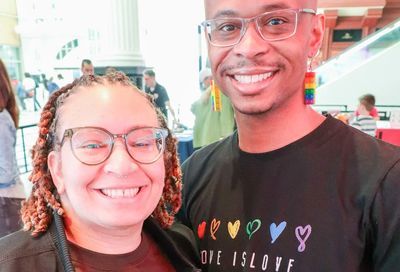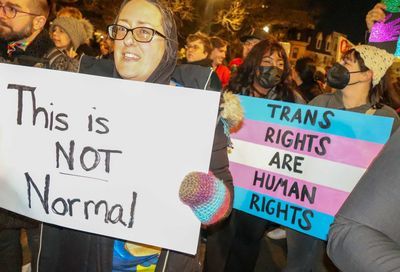Death Match
''The Hunger Games'' allows for social commentary and the very kind of mindless bloodshed it's allegedly trying to decry
The first thing worth mentioning about The Hunger Games is the silence. Few characters say much, and those that do don’t repeat themselves. Their thoughts, feelings, and schemes are rarely spelled out, but rather, punctuated by quiet.
As someone who read Suzanne Collins’s trilogy of young adult novels that inspired the movie, that quiet is fulfilling — and frankly, more than I had prepared to see in a big-budget adaptation with massive box-office ambition. For those who are not familiar, though, I can’t help but wonder if the silence will have the same effect. Can the story’s intricacies hold up without an internal monologue?

The Hunger Games
Even if a bit muddled for newcomers, The Hunger Games still has a wicked hook. Set in a post-war North America, now a country called Panem, it portrays a future where a despotic Capitol rules over 12 satellite districts. Every year, each district is forced to offer up two teenagers as ”tributes” for the Hunger Games, a televised melee to the death inside a woodland arena. The Games serve a dual purpose: to remind the oppressed masses that they’re powerless, and to entertain the hedonistic, couture-minded citizens of the Capitol.
Katniss Everdeen (Jennifer Lawrence) isn’t chosen during the ”Reaping,” as it’s called, but volunteers in order to replace her 11-year old sister, Prim (Willow Shields). Her male counterpart, a hunky baker’s son named Peeta Mellark (Josh Hutcherson), has decidedly less say in the matter. They’re from District 12, a poor, coal-mining region located in Appalachia that’s more concerned about meager food rations than teenage death matches. It’s a gray, mournful place. Hours later, Katniss and Peeta are introduced to Haymitch Abernathy (Woody Harrelson), an alcoholic Games survivor assigned to train them, and Effie Trinket (Elizabeth Banks), their oblivious, privileged chaperone, who whisk them off to the Capitol to train. The Games, as they say, are about to begin.
The Hunger Games thrives on this premise; it allows for social commentary and the very kind of mindless bloodshed it’s allegedly trying to decry. Under other circumstances, that relationship would seem hypocritical, but as it was in the book, the violence is a practical necessity. That children die in this movie without undermining director Gary Ross’s restrained brand of action is an accomplishment, not an offense. He balances visceral barbarism with a lack of out-and-out gore – most disturbingly in a scene that makes use of a genetically modified wasps’ nest – and for that, he deserves credit.
What takes The Hunger Games from a good adaptation to a great movie, though, is the seamless talent gathered among its cast and crew. Lawrence is hard and captivating as Katniss, while every bit of her performance is relayed through T-Bone Burnett and James Newton Howard’s score. Proving yet again that he’s the best bargain in Hollywood, Stanley Tucci is all sorts of fantastic as Caesar Flickerman, a television host who appears to be Ryan Seacrest on an acid trip. And, perhaps most easily overlooked, cinematographer Tom Stern balances dystopian blight and new-age futurism at the brisk pace that action demands, all while shooting an awfully good-looking movie. That this was all accomplished under studio pressure to kick-start a billion-dollar franchise just makes their success all the more impressive.




Starring Jennifer Lawrence, Josh Hutcherson, Stanley Tucci
Rated PG-13
142 Minutes
Opens March 23
Area Theaters
And yet, it’s still missing something. When Katniss is inside the arena, fighting for her life, I kept thinking about how her thoughts were conveyed in the book. She doesn’t talk much in either version, but Collins poured tons of ink describing how she felt. While Ross adapts her story faithfully, that layer of storytelling is gone. Lawrence is a superb actress – and her eyes confirmed most of what I remembered reading – but there’s nonetheless a loss from page to screen, replaced by silence.
Of course, that’s not to say the book is better, or that it’s necessary reading to appreciate the movie, as those sorts of pinky-raised critiques typically go. Collins’s version was so ripe for adaptation, it might as well have been a novelization of a movie yet to be made. In that movie, it turns out there’s a world of meaning behind each dramatic pause. The Hunger Games is better for that, too. I just hope you don’t have to know it to see it.
Support Metro Weekly’s Journalism
These are challenging times for news organizations. And yet it’s crucial we stay active and provide vital resources and information to both our local readers and the world. So won’t you please take a moment and consider supporting Metro Weekly with a membership? For as little as $5 a month, you can help ensure Metro Weekly magazine and MetroWeekly.com remain free, viable resources as we provide the best, most diverse, culturally-resonant LGBTQ coverage in both the D.C. region and around the world. Memberships come with exclusive perks and discounts, your own personal digital delivery of each week’s magazine (and an archive), access to our Member's Lounge when it launches this fall, and exclusive members-only items like Metro Weekly Membership Mugs and Tote Bags! Check out all our membership levels here and please join us today!


















